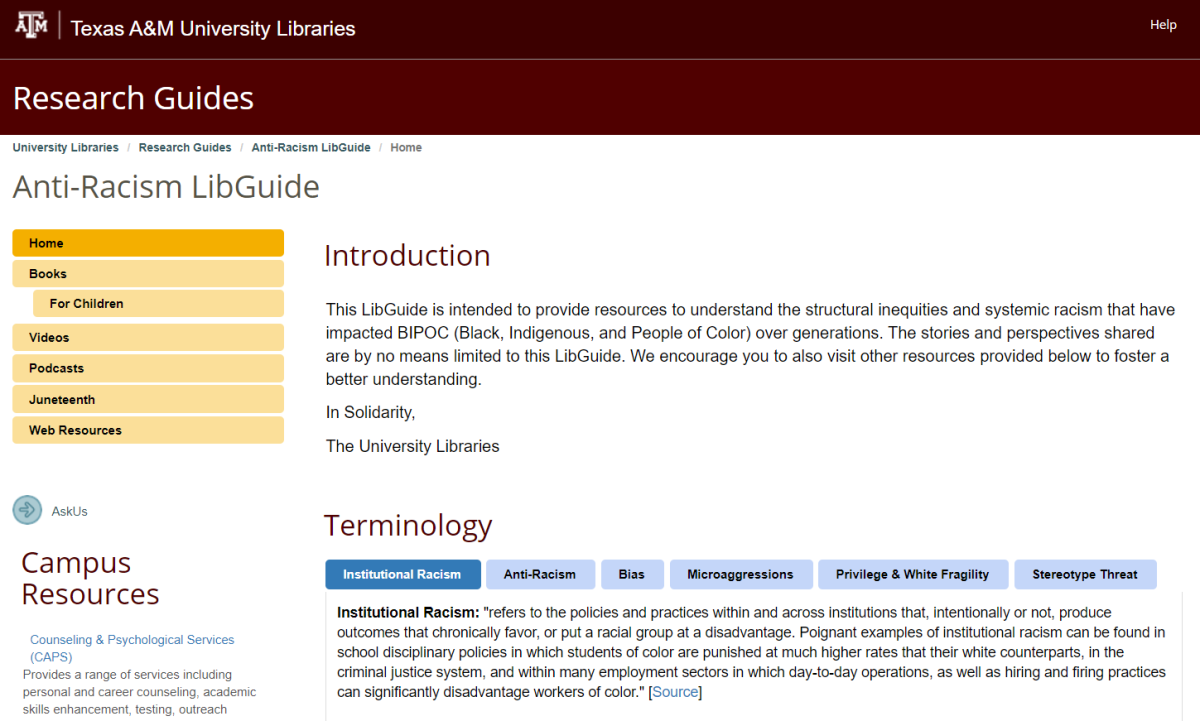As conversations about race continue on campus and online, many are pushing the need for education on the subject.
To help with this cause, the Texas A&M University Libraries have created an Anti-Racism LibGuide with online resources covering topics such as institutional racism, privilege and white fragility, bias and microaggressions as well as books, podcasts and videos about Black experiences.
University libraries diversity program coordinator Marisol Moreno said the guide came about following a Libraries’ Diversity Advancement Committee discussion about recent Black Lives Matter protests and police brutality.
“While building the LibGuide, we made an effort to highlight materials that are readily available in our digital collection, as well as resources outside of the Libraries that were freely accessible to everyone,” Moreno said. “We have access to so many resources that not only allow folks to explore diverse voices, but also gives them an opportunity to learn from the activists and scholars who have been at the forefront of dismantling institutional racism.”
The premise for the term “anti-racism” comes from political activist Angela Davis’ statement “In a racist society, it is not enough to be non-racist, we must be anti-racist.” According to the guide, anti-racism is a way of looking at and reacting to society “in order to transform it.”
“For white people, being antiracist evolves with their racial identity development. They must acknowledge and understand their privilege, work to change their internalized racism, and interrupt racism when they see it,” the guide reads. “For people of color, it means recognizing how race and racism have been internalized, and whether it has been applied to other people of color.”
According to sociology professor, Joe Feagan, Ph.D., white privilege stems from a preconceived idea of white virtuousness and the accompanying systematic oppression of non-whites.
“That oppression has been imbedded in our economic, political, educational and other institutions during slavery and Jim Crow, resulting in an estimated $20-30 trillion in just black economic losses and extensive present-day discrimination,” Feagan said. “Add-in other white oppression: genocidal oppression of Native Americans… Mexican Americans and Chinese Americans [and] many other groups of color thereafter. This oppression unjustly enriched whites at great expense of Americans of color. That is what white power and privilege really means.”
The key to overcoming this internal and external racism, Feagan said, is by joining groups such as the Antiracism Study Dialogue Circles, reading books and guides on racism and taking courses on anti-racism, and historical and ongoing oppression.
“It usually takes months, years, even a lifetime, for whites to deframe their dominant white racial frame and replace it with an authentic liberty and justice for all frame,” Feagan said. “We whites are taught that white racist frame from cradle to grave by our friends, peers, relatives, so that is unsurprising it takes much time and effort to even begin to change it.”
Moreno said she encourages readers to look beyond the guide, do their own research and start conversations with others about how to be anti-racist in today’s society.
“Our guide is intended to be a starting point for people to understand the structural inequities that have impacted BIPOC and other marginalized groups over generations,” Moreno said. “We hope it encourages honest and challenging conversations, particularly for the folks who are just becoming aware and have an honest desire to do right by the people who are being discriminated [against].”
To access the A&M Libraries Anti-Racism LibGuide, click here.
Texas A&M Libraries create Anti-Racism guide
July 13, 2020
Donate to The Battalion
Your donation will support the student journalists of Texas A&M University - College Station. Your contribution will allow us to purchase equipment and cover our annual website hosting costs.





















